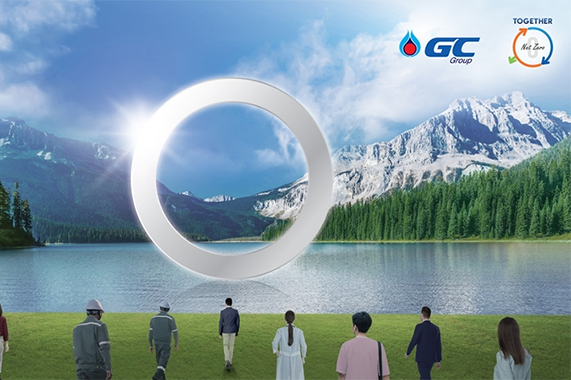More news
- Ask Joe Powder – October 2024
- Chinese paint majors look to domestic consumer sales as commercial real estate slumps
- Architectural coatings in Nepal and Bhutan
- A wild ride for U.S. construction and housing: Coatings and adhesives opportunities in 202...
- Levant paint industry and market marred by armed conflict and civil turmoil

Leading chemicals company, PTT Global Chemical Public Company Limited (GC), along with its subsidiaries and affiliates as "GC Group” has announced its ambitious "Together To Net Zero” commitments to a sustainable future, significantly raising its medium-term targets to reduce current greenhouse gas emissions by 20% by 2030 on its journey way to achieving Net Zero by 2050.
As a global chemicals company committed to creating a better quality of life for all, today’s roadmap further strengthens GC Group’s leading progress in combining environmentally-friendly innovations with advanced technologies. It is the latest in a series of global initiatives by GC to drive sustainable leadership in line with its "Chemistry for Better Living” commitment, driving long-term sustainable business practices by balancing its focus among the environment, society, and corporate governance (ESG), while integrating the Circular Economy principles in accordance with the SDGs framework.
GC plans to invest up to US$1bn by 2030, with increased investment in following decades, and will achieve today’s commitments without compromising business growth through its outlined three-pillar Low Carbon Transition Framework.
"Today, I am proud to announce our ‘Together To Net Zero’ commitments, which focus on balancing strategically between business growth and sustainability outcomes. We have a clear roadmap and are increasing our medium-term targets to reduce by 20% within 2030 on the journey to achieving Net Zero by 2050 in line with the Paris Agreement. Additionally, we plan to reduce greenhouse gases in our value chain by 50%, propelling our customers and suppliers to participate in this commitment together,” said Dr Kongrapan Intarajang, CEO of GC Group.
"Climate change is one of the most significant issues of our time and by further optimising GC’s existing sustainable processes and initiatives – rated number one in the world for Sustainability in the DJSI Chemicals Sector for two consecutive years – we are well-placed to achieve these improved targets. By focusing on our Low Carbon Transition Framework, we will successfully reduce the carbon footprint of our portfolio and entire value chain to help our customers reduce their own emissions.”
GC transitions to low carbon with new technologies, businesses, and compensation
The Low Carbon Transition Framework is central to GC’s global transformation to achieving Net Zero by 2050, driven by three core pillars.
The first is Efficiency-driven, maximising efficiency across all assets – guided by the "5Rs” principle and digitalisation – while utilising existing and adopting new low carbon technologies, as well as increasing the use of low carbon power and low carbon processes, to further accelerate greenhouse gas reduction.
The second pillar is Portfolio-driven, expanding GC Group’s product and application portfolio through innovation and investment. This includes transitioning its portfolio to low carbon businesses, including high- value performance chemicals, as well as businesses in bio, green, and circularity, as evidenced by the recent acquisitions of allnex, the leading global producer of industrial coating resins with a broad range of coating polymers and additives. allnex holds strong low carbon values, pioneering sustainable innovations for the coating industry for more than 70 years and receiving the Gold Rating for Sustainability from EcoVadis.
Another example is GC’s joint venture company, NatureWorks, the world’s number one bioplastic producer. NatureWorks recently announced the construction of a new fully integrated biopolymer production facility in Thailand, making GC the only company in the world to own both petrochemical and bioplastics businesses alongside a waste management programme.
GC expects the switch to net zero will lead to a flow-on effect for its customers and its Portfolio-driven pillar will focus on "Greater Goods” – delivering greater quality of life, greater relevance to new lifestyles, and providing even greater care for the world through products that positively impact all aspects of society. Aligned with its "Chemistry for Better Living” mission, the Portfolio-driven pillar also provides multi-layered solutions to support customers’ greenhouse gas reduction journeys: from low carbon product offerings to end-life management to co-creating value-chain and plastic waste reduction.
The final pillar of GC’s Low Carbon Transition Framework is Compensation-driven, which focuses on the implementation of nature-based solutions, while continuing to incubate and invest in new carbon capture technologies through multiple approaches including corporate venture capitals, partnerships, and joint venture initiatives to make the transformation economically viable.
Dr Kongrapan Intarajang said: "We understand the importance of our role in the industry, and we want to continue supplying customers and the value chain our leading products with emissions-reducing benefits. Our announcements today enhance GC’s long-standing commitment and leadership on sustainability. With GC’s Low Carbon Transition Framework, we can continue to develop and provide worldwide customers with efficient products.”
"We believe our ambitious targets for Net Zero by 2050 are achievable through the collaboration of industry, consumers, and policymakers. Public-private discussions are crucial to reversing the impacts of climate change. We look forward to continued engagement with various players in the global markets and their continued support to reducing greenhouse gas emissions and helping the world to achieve net zero.”
For more information about Together to Net Zero, please visit https://sustainability.pttgcgr



